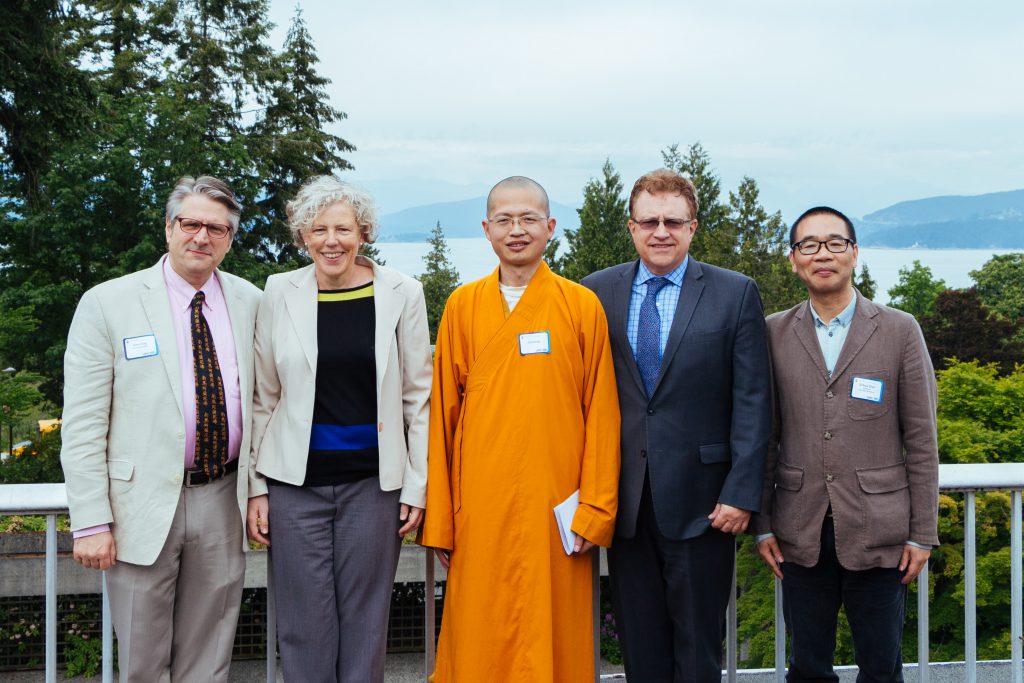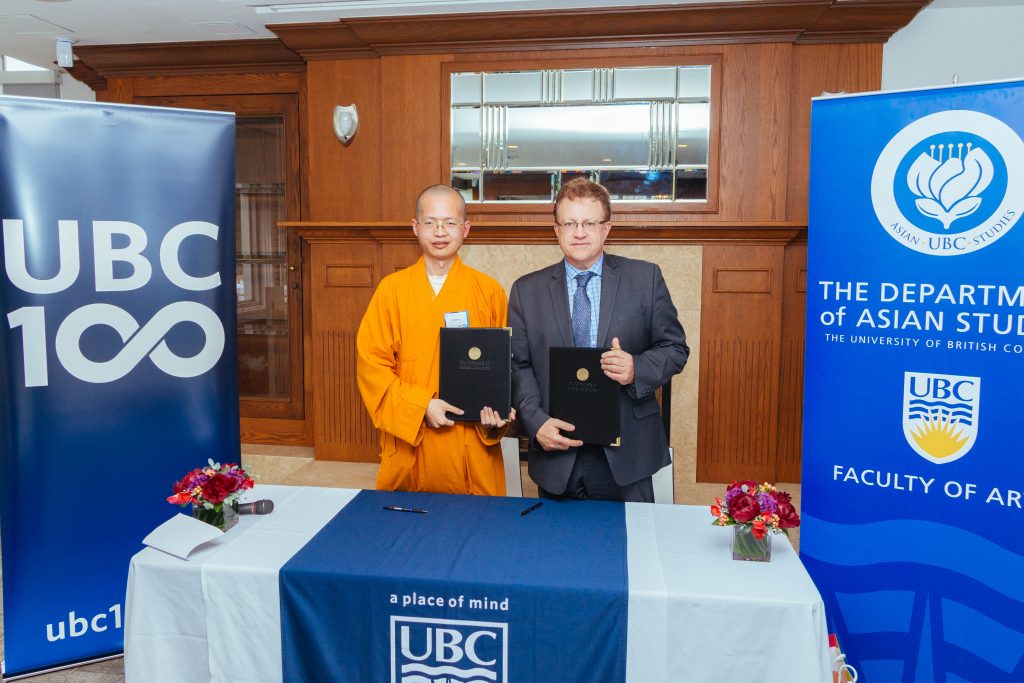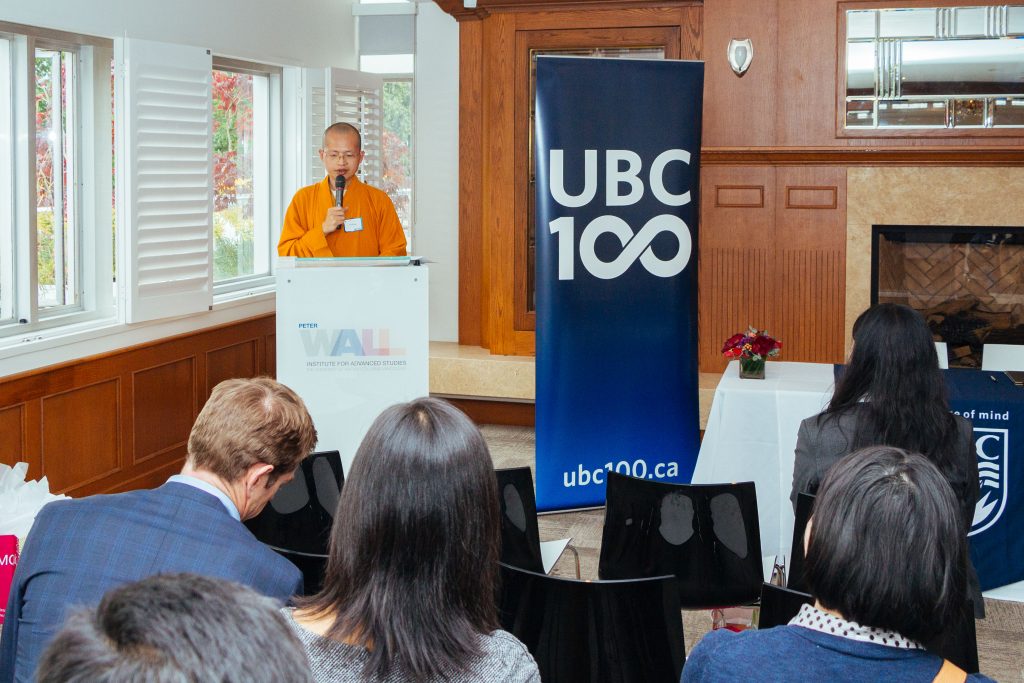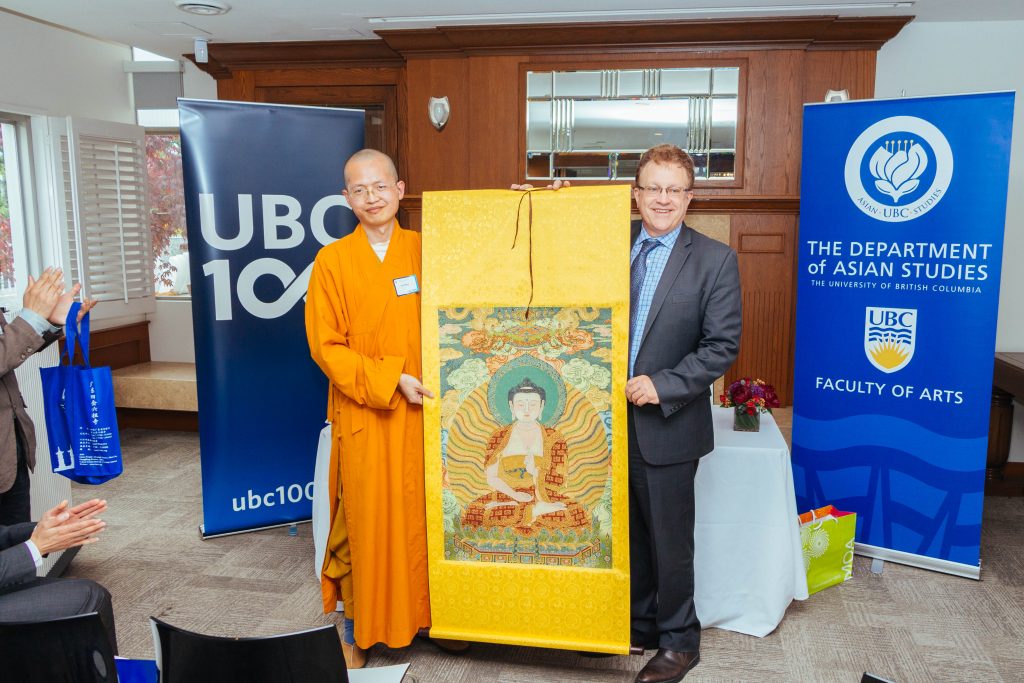The University of British Columbia and Hong Kong’s Siu Ling Shan (Ling Hin Fat Yuen) Buddhist Charitable Foundation have created a strategic partnership to support research on Buddhism at UBC.
At a signing ceremony held May 18, 2016, Venerable Dengjue, the vice-secretary for the World Association for the Communication of Buddhist Culture, and the Superintendent of Hong Kong’s Siu Ling Shan, met with UBC Provost Angela Redish, Dean of Arts, Gage Averill and Head of the Asian Studies department, Professor Ross King to present a cheque of more than $2.2 million to establish an interdisciplinary academic research network comprised of specialist scholars.


(From left to right: Ross King (Department Head), Angela Redish (Vice-President Academic), Ven. Dengjue, Gage Averill (Dean of Arts), Prof. Jinhua Chen)
The six-year collaboration will support various types of academic research and cultural activities including close to twenty collaborative projects such as conferences, cultural festivals, fellowships for graduate students and postdoctoral fellows, research periodicals, series of academic exchanges and courses on Buddhist Studies.


Hong Kong’s Siu Ling Shan (Ling Hin Fat Yuen) Buddhist Charitable Foundation has presently developed cooperatives with more than ten top-level universities in China such as Chinese University of Hong Kong, Peking University, Zhejiang University, Wuhan University and National Sun Yat-sen University, and world famous institutions including Saint Petersburg State University and École française d’Extrême-Orient, establishing various research centers related to Buddhism while promoting the modernization of Buddhism.


“The gift from the Siu Ling Shan Buddhist Charitable Foundation will result in a groundbreaking initiative. This donation will ensure that UBC continues to lead in Buddhist and East Asian studies, that it develops further as a centre for research and education on Buddhism, and that it emerge as a fertile meeting ground for exchange,” said UBC Dean of Arts, Professor Gage Averill.
Professor Ross King agreed. “This will provide a powerful force for the training of students in Asian Studies, international collaboration and for research on East Asia,” he said.
Finally, Prof. Jinhua Chen, who has been responsible for the collaborative research project, stated that this significant funding will go a long to building an international research network for Buddhist Studies.


University of British Columbia (UBC) Interview with Venerable Dengjue
(June 19, 2016)
- Why has your monastery decided to develop Buddhist Studies in collaboration with universities?
The primary aim behind the decision to develop Buddhist Studies in collaboration with universities is to promote discussion and exchange between the Buddhist and academic worlds, allowing for Buddhist wisdom to make a greater contribution to human civilization and social development.
On one hand we hope to use modernized language to carry out a reinterpretation of Buddhadharma while promoting multidisciplinary academic research and opening up the barriers between systems of religious discourse and modern scientific discourse. On the other hand, we also hope to promote an improved transmission of Buddhadharma and the cultivation of talent in Buddhist Studies through the power and platform of the university.
- How did your monastery take note of UBC? Why did you decide to collaborate with them?
We have always been on track to cooperate in the development of Buddhist Studies with both domestic and international universities and scholars of the top tier.
At the beginning of this year, I had the good fortune of meeting Professor Jinhua Chen at Sun Yat-sen University in Guangdong province in China. Professor Chen is a famous scholar of Buddhist Studies in the Department of Asian Studies in the Faculty of Arts at UBC. Not only does he have a solid foundation in academia, he also possesses a broad academic outlook.
I invited Professor Jinhua Chen to come to Liuzu-si to give a splendid academic lecture and we discovered that our philosophies are quite in agreement. My venerable teacher, the abbot of Liuzu-si, Venerable Dayuan, continued a deep exchange with Professor Chen after the lecture had concluded. Professor Chen also quite approved of our philosophy, which is why we continued communicating and discussing the matter for around four months before finally reaching a plan to collaborate.
I believe that our collaboration with Prof. Chen Jinhua and UBC was an extremely important and well-informed decision.
- How does your monastery understand the relationship between scholarship and faith?
We believe that faith and scholarship have different focal points because they make different appeals. We value the independence of scholarship and would not use faith to restrict research. I think this is also one of the reasons why we are able to cooperate smoothly with each university. Discussion and exchange between academic research on religion and religious faith can help academic research to deepen and become more rigorous while also ensuring that religious faith becomes more rational, and leading to better transmission and development.
- What plans does your monastery have for spreading the Dharma internationally? Are there any plans for the Vancouver area?
In terms of spreading the Dharma internationally, we are promoting Buddhism’s spread in nations making up the seven great languages in the world, eliminating language limitations and ensuring that the wisdom of Buddhadharma can benefit all humanity through translation of the Buddhist canon. We have at present already finished translating into eleven languages (including English, French, German and Spanish) the Platform Sūtra of the Sixth Patriarch, plus compiling relevant commentaries, and have formally presented this great cultural achievement to the world.
We have also carried out broad and deep exchanges with eminent monks and close to a thousand specialist scholars of various countries in the areas of Buddhist culture and Chan Studies, thereby promoting the spread of Chinese Buddhist culture overseas, in particular the culture of the Sixth Patriarch and Chan Studies related to him. Venerable Dayuan is working together with famous Buddhist universities in countries around the world, having already formally established four “Sixth Patriarch Huineng International Chan Studies Institutes” (Korea, Cambodia, Thailand and Sri Lanka) with the aim of promoting Chinese Chan culture and the philosophy of the Sixth Patriarch.
There are numerous immigrants in Vancouver, a city that is characterized by a strong degree of cultural tolerance. Our collaboration with UBC will be an important link in the promotion of the Dharma in North America linked with Liuzu-si. We have already made preparations to carry out a festival of Buddhist culture in Vancouver next year. At a later stage we might also start a series of cultural and educational activities in Vancouver, even establishing Chan training centers and an institute of Chan studies.
- What sorts of distinguishing features does your monastery have in spreading the Dharma?
With respect to Buddhism, we need to reflect deeply on the circumstances of a new age with questions like: how to better inherit the achievements of human civilization, how to better promote transmission and exchange between different cultures, and how to play a role in the clashes of traditions and religions of various contemporary cultures.
This is why our head teacher, Ven. Shangda Xiayuan, based on a strong sense of responsibility and mission, has led his lay and monastic disciples in a vow to make a contribution to the collective fate of human civilization, serving a collective awareness of human life, while proposing the establishment of four great systems of Buddhist scholarship, spiritual practice, Dharma dissemination and socialization services, thereby promoting the development of Buddhism’s modernization.
I already briefly introduced the establishment of systems of Buddhist scholarship and international Dharma dissemination above. Let me now also briefly explain the establishment of systems of spiritual practice and socialization services.
We not only emphasize research but also very much emphasize spiritual practice. It is only when you personally experience the excellent results of Buddhadharma that you are able to integrate these into life and resolve actual real life problems.
The establishment of a spiritual practice for contemporary Buddhism is based on the system of practice and study for contemporary Buddhism that was formulated by Venerable Dayuan. At its core is the practice and cultivation of the Buddhadharma. After many years of instruction and training he has been setting up a training base for each school of Buddhist thought. At the same time, the spread of the eight schools of Buddhism is promoted while these are being simultaneously revived in their entirety. Meanwhile, urban Chan halls are being built, thereby promoting the implementation of education related to life awareness in contemporary Buddhism.
The establishment of a system of contemporary Buddhist socialization services promotes contemporary Buddhist socialization services, integration with the times, and better help for the health and happiness of all beings through public charity. At present we have already established modernized charitable institutions such as the Tianzhu foundations that are guided by modernized ideologies and lead multifaced charity programs through “regular charity”, “living charity”, “cultural charity” and “spiritual charity”. They have received wide praise from all corners of society.
To sum up, the establishment of these four systems is characteristic of how our monastery is presently spreading the Dharma.
- Please briefly discuss how your monastery in the next five to ten years will be collaborating with educational institutions around the world, in particular in the West.
Collaboration with educational institutions in the West is being developed in coordination with our aims of establishing systems of international Dharma dissemination and scholarship.
Within the areas of the seven major languages, it is through collaborating with related national universities that we promote the establishment of the Buddhist Triple Gem in these language areas in a variety of ways, including, for instance, launching conferences and research projects.
As a world famous university, UBC possesses top-level research standards and broad social influence. We hope that UBC will be able to function as an important platform and support for the establishment of a system of contemporary Buddhist scholarship. On one hand, we must integrate the research capacities of each university that we are collaborating with while developing each of their superior points. On the other hand, UBC will be a collaborator in the West, promoting cooperative programs between top-level international universities and building up an international network of Buddhist research.


